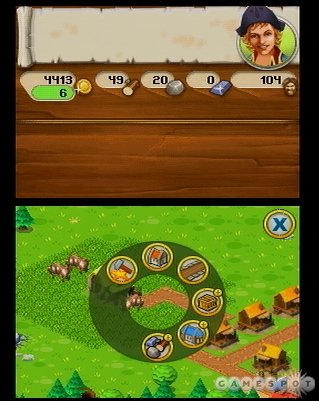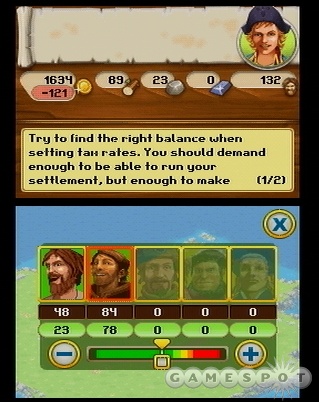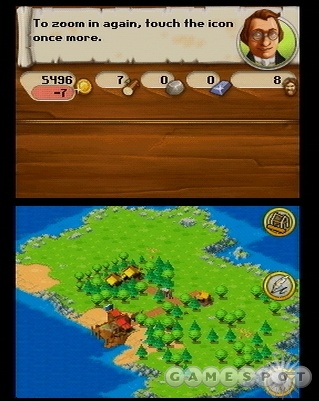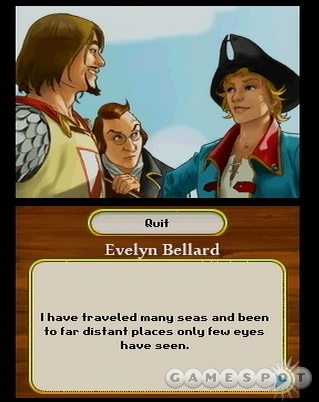Set in a bright, idealized version of the 1400s, Dawn of Discovery is a charming game of exploration and city building, with mechanics that are straightforward enough for anyone to grasp yet complex enough to stay satisfying in the long term. Dawn of Discovery for the Wii and DS share their title with a PC game, but aside from the era in which they take place and the most fundamental gameplay concepts, the games are quite different. This actually benefits the Wii and DS versions, streamlining the number of resources and the overall scale into something more comfortably manageable for these platforms. It's not without its flaws, but it gets most things right, and the various elements come together to create a captivating experience.

There are two modes of play. The Story mode is a lengthy campaign that takes you from building tiny fishing villages to founding massive cities of stone. The tale it tells is populated with overly broad characters--generous sultans, arrogant nobles, treacherous women--but it breaks up your path to progress into a series of bite-size objectives that make putting the game down very difficult. It also serves as an effective tutorial for the Continuous Play mode in which you customize a variety of aspects to your liking, including the overall size of the world, the size of the islands in that world, and whether you must compete for islands and resources with any AI opponents. Then, it sets you free to play in that world for as long as you like. In either case, the controls and interface work very well, laying out all the buildings you can construct in easily managed menus that let you simply tap where you want the structure to go and plop it down on the ground. Of course, the act of creating cities is nothing new to games, but Dawn of Discovery's effective interface makes it feel playful and pleasurable.
Regardless of the mode you're playing, you'll need to settle islands and create pleasant living conditions for your residents, helping them advance up the social ladder from simple pioneers to lofty aristocrats. It's not out of sheer altruism that you do this; the higher your citizens' quality of life becomes, the more taxes you can extract from them. Pioneers require only food, milk, and a nearby chapel to become settlers, but with each successive rank, the needs become more numerous and complex, and your people more demanding. For instance, in addition to carrying over all the needs of pioneers, settlers also require herbs, clothes, nearby convent schools, and guest houses to become citizens. Production flows become a bit more elaborate, as well. Producing clothes, for instance, is a two-step process, requiring hemp farms to grow the material and huts for weavers to process it. The complexity develops enough to stay interesting as your society advances but not so much that it significantly slows down the pace of development.
You also need to be mindful of your overall economic balance. Each production facility drains a set amount of gold coins over time, and you'll need to avoid creating redundant facilities and manage the tax rate for your residents to ensure that those operating expenses are outweighed by a steady influx of gold. You can also sell surpluses of your own goods or buy goods you're lacking on the open market. Once you get the basics down, you'll be able to see your settlements advance from level to level in no time, and watching your towns flourish into ever-expanding cities is a joy. As your settlements grow, they'll become prone to such problems as fires, rat infestations, and even the plague, which require firehouses, rat catchers, and hospitals to deal with these threats.

Sadly, managing the resources you need to produce isn't straightforward, which makes the otherwise delightful business of city building occasionally irksome. With any of your production facilities, you can tell at a glance at what percentage of their peak efficiency they're operating. However, it's not clear how this translates into tons of goods produced. Naturally, as your population grows, so too does the amount of each goods that the population consumes, but there's no clear way to determine just how many tons of a particular good your residents require. This makes it needlessly difficult to anticipate upcoming shortages, and it's easy to get frustrated when you find yourself in the midst of a dairy crisis or similar shortage that could have been avoided with clearer information regarding supply and demand. Scrambling to create more facilities to produce whatever you're suddenly lacking works, and over time, through trial and error, you'll develop a better sense of how many production facilities you'll need for each of your goods, but that's hardly an ideal way to handle this important aspect of gameplay.
There wouldn't be any incentive to do much discovering if you could grow everything you needed on the first island you settled. Fertility varies from island to island, and no single island is going to have soil capable of meeting all of your residents' needs, so it becomes necessary to build exploration ships, seek out new islands, and expand your realm. Early on, most of the world is unknown and cannot be entered. Attaining access to these unexplored parts of the world is handled in an unusual but fun way. There's a series of achievements available to you that reward you with sea charts, revealing previously hidden areas. The goals for these achievements are varied, so regardless of what you enjoy most about being a leader, there's sure to be achievements that appeal to you. The goals range from stockpiling a certain amount of a given good to having a specific number of gold coins in your coffers.
Perhaps the most enjoyable achievements, though, are those that center on treasure hunting. You can purchase maps that reveal the locations of unknown treasures. Then, you can set sail and hoist the chests aboard your ship and race to get them back to your nearest island safely. This is made trickier by the corsairs patrolling the seas who want nothing more than to separate you from your newly found treasure. Unfortunately, ship movement is needlessly slow and cumbersome, which makes attempting to elude the corsairs more often a source of frustration than enjoyment. Still, successfully retrieving buried treasures is satisfying. The chests contain gold or useful goods and also help you earn those achievements that allow you to uncover more of the world, which makes the prospect of treasure hunting doubly rewarding.

Of course, when you're competing with rivals for limited islands and resources, not all disputes are going to be settled peacefully. There is combat in Dawn of Discovery, but it's very simplistic. There's only one military structure you can build, the barracks, which produces the only military unit, troops. You can defend your island from possible attacks by stationing your troops in warehouses and shipyards. You can also invade islands belonging to other rulers by building battleships to transport your troops to the enemy shores. Once your troops meet enemy troops in battle, the sounds of swords clashing ensue and the number of troops on each side dwindles until only one side is left standing. That's all there is to it. It's simple, and those looking for a more robust combat experience will be disappointed, but it keeps the focus on city building and resource management rather than military strategy.
Dawn of Discovery for the DS has simple visuals that depict your buildings and people with little detail, but despite the lack of visual flair, watching your villages develop into cities is a delight. The structures are cute in their simplicity, and there's some activity on the streets to liven things up. You can zoom in close to get a good view of the market carts going to and fro along your roads and zoom out far enough to look down upon entire islands. The jaunty music befits the visuals and evokes the adventurous spirit of settling on a new frontier. There's also a smattering of voice acting on hand in the Story mode, which helps give a better sense of the characters than you would get from the writing alone.

It doesn't have the era-spanning historical scope that many games of this type have, nor does it bring anything new to the table. But the flaws here aren't enough to overshadow the pleasure of building your cities, sailing the seas, and discovering what awaits over the horizon. The brisk pace and accessible city-building mechanics make Dawn of Discovery a game that should appeal to the adventurous spirit in just about anyone.